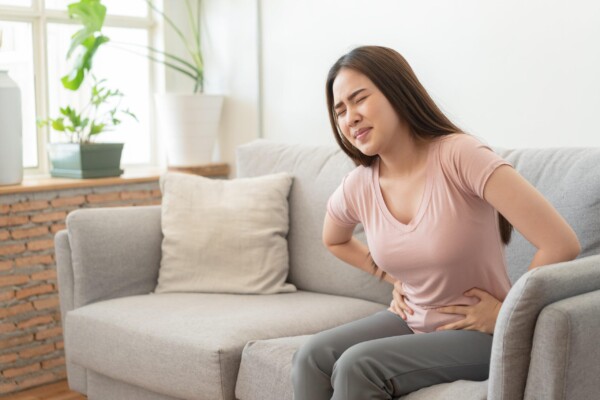Symptoms of Hormone Imbalance in Women:
Comprehensive Guide
Symptoms of Hormonal Imbalance

A Comprehensive Guide to the Symptoms of Hormonal Imbalance
Hormonal imbalances can affect women at any age, not just during perimenopause or menopause. Unfortunately, many of these symptoms are frequently dismissed, misdiagnosed, or incorrectly attributed solely to aging or stress. Recognizing these signs is the crucial first step toward finding a solution.

Explore the most common symptoms below to see if your body is signaling a need for hormonal support:
- Low Energy and Persistent Fatigue: Do you feel a deep, chronic exhaustion that isn't relieved by a full night's sleep? This can signal that key hormones like thyroid, cortisol, or progesterone are no longer adequately supporting your body’s energy needs
- Brain Fog, Lack of Focus, or Memory Loss: Are you struggling to concentrate, remember important details, or feel mentally sharp? Hormonal shifts, especially in estrogen, thyroid, or cortisol, are often the underlying cause
- Increased Body Fat or Unexplained Weight Gain: Have you noticed stubborn fat accumulating, particularly around your abdomen? This can be a direct result of imbalances in insulin, estrogen, or cortisol, even if your diet and exercise habits haven't changed
- Loss of Muscle Mass or Strength: If you've noticed reduced muscle tone or find that your workouts aren't as effective as they once were, a hormonal deficiency in testosterone or other key hormones could be hindering muscle maintenance
- Anxiety, Depression, Mood Swings, or Irritability: Your hormones are directly linked to your brain chemistry. Imbalances in estrogen and progesterone are a primary cause of increased anxiety, irritability, and emotional volatility
- Low Libido or Changes in Sex Drive: Has your interest in sex or your physical responsiveness declined? This is often a treatable symptom directly related to low levels of testosterone and estrogen
- Irregular, Painful, or Absent Periods: Changes in your menstrual cycle are one of the clearest signs that your reproductive hormones are fluctuating or declining
- Vaginal Dryness or Discomfort During Intercourse: Low estrogen can thin vaginal tissue and decrease natural lubrication, causing significant discomfort and impacting your quality of life
- Trouble Sleeping or Insomnia: Difficulty falling asleep or, more commonly, waking up in the middle of the night can be a direct result of imbalances in progesterone and cortisol
- Hot Flashes or Night Sweats: These sudden waves of intense heat are hallmark symptoms of fluctuating estrogen levels during perimenopause and menopause
- Hair Loss or Thinning Hair: Changes in your hair's thickness and texture often point to imbalances in thyroid hormones, estrogen, or androgens like DHEA
- Acne or Skin Texture Changes: Persistent breakouts, especially along the jawline, or a loss of skin elasticity can reflect deeper hormonal disturbances

Why Recognizing These Symptoms Matters
Hormonal imbalance is more than just an inconvenience; if left unaddressed, it can increase your risk of long-term health issues like osteoporosis, heart disease, and metabolic disorders. The EvexiPEL Method offers a science-backed, personalized approach to help you regain balance and feel like yourself again.

Why Choose EVEXIAS Health Solutions?
Recognizing your symptoms is the first step, but choosing the right partner for your health journey is crucial. The EVEXIAS Health Solutions approach is designed for women who are ready to move beyond temporary fixes and address the root cause of their health concerns.
- Unparalleled Expertise in Women's Health: Our providers have undergone rigorous, advanced training in the EvexiPEL Method, specializing in the complex interplay of female hormones, metabolism, and vitality
- A Personalized, Data-Driven Approach: We don't guess, we test. Your journey begins with comprehensive lab testing to create a precise snapshot of your hormonal health, allowing us to create a treatment plan that is 100% customized to you
- Advanced, Science-Backed Therapies: We utilize cutting-edge solutions, including our proprietary hormone pellet therapy, targeted peptides, and clinician-formulated nutraceuticals to deliver consistent, superior results
- A Whole-Body Wellness Philosophy: We understand that hormones are just one piece of a complex puzzle. Your provider will support your health from every angle, integrating nutrition, stress management, and lifestyle strategies for complete vitality

The EVEXIAS Health Solutions Solution: Your Personalized Path to Wellness
The EVEXIAS Health Solutions Solution is a comprehensive, multi-faceted approach that moves beyond symptom management to restore your health at its foundation. Your personalized journey is guided by the data from your comprehensive lab testing and built upon the core pillars of the EvexiPEL Method.

Your custom plan will include a strategic combination of:
- Bioidentical Hormone Replacement Therapy (BHRT): To restore your estrogen, progesterone, and testosterone to optimal levels, providing steady relief from your symptoms
- Advanced Peptide Therapy: To accelerate your results with targeted benefits for cellular repair, inflammation, and metabolic support
- Targeted Nutraceuticals: To correct any underlying nutrient deficiencies that are impacting your hormonal health
- Strategic Lifestyle Guidance: Your provider will offer expert advice on nutrition, stress management, and sleep to support your hormonal health for the long term

You Don't Have to Live with the Symptoms. You Deserve a Solution.
The fatigue, brain fog, and emotional swings you're experiencing are not your new normal; they are signals that it's time for a change. Listening to your body and taking action is the most powerful step you can take toward reclaiming your energy, clarity, and confidence. Your best years are not behind you; they are waiting to be restored.
-
Symptoms of Hormonal Imbalance
- Alaska
-
Arizona
- Symptoms of Women’s Hormonal Imbalance in Arizona
- Symptoms of Women’s Hormonal Imbalance in Chandler, AZ
- Symptoms of Women’s Hormonal Imbalance in Gilbert, AZ
- Symptoms of Women’s Hormonal Imbalance in Glendale, AZ
- Symptoms of Women’s Hormonal Imbalance in Mesa, AZ
- Symptoms of Women’s Hormonal Imbalance in Phoenix, AZ
- Symptoms of Women’s Hormonal Imbalance in Tucson, AZ
-
California
- Symptoms of Women’s Hormonal Imbalance in California
- Symptoms of Women’s Hormonal Imbalance in Anaheim, CA
- Symptoms of Women’s Hormonal Imbalance in Bakersfield, CA
- Symptoms of Women’s Hormonal Imbalance in Chula Vista, CA
- Symptoms of Women’s Hormonal Imbalance in Fresno, CA
- Symptoms of Women’s Hormonal Imbalance in Irvine, CA
- Symptoms of Women’s Hormonal Imbalance in Long Beach, CA
- Symptoms of Women’s Hormonal Imbalance in Los Angeles, CA
- Symptoms of Women’s Hormonal Imbalance in Oakland, CA
- Symptoms of Women’s Hormonal Imbalance in Riverside, CA
- Symptoms of Women’s Hormonal Imbalance in Sacramento, CA
- Symptoms of Women’s Hormonal Imbalance in San Diego, CA
- Symptoms of Women’s Hormonal Imbalance in San Francisco, CA
- Symptoms of Women’s Hormonal Imbalance in San Jose, CA
- Symptoms of Women’s Hormonal Imbalance in Santa Ana, CA
- Symptoms of Women’s Hormonal Imbalance in Stockton, CA
- Colorado
- District of Columbia
-
Florida
- Symptoms of Women’s Hormonal Imbalance in Florida
- Symptoms of Women’s Hormonal Imbalance in Hialeah, FL
- Symptoms of Women’s Hormonal Imbalance in Jacksonville, FL
- Symptoms of Women’s Hormonal Imbalance in Miami, FL
- Symptoms of Women’s Hormonal Imbalance in Orlando, FL
- Symptoms of Women’s Hormonal Imbalance in St Petersburg, FL
- Symptoms of Women’s Hormonal Imbalance in Tampa, FL
- Georgia
- Hawaii
- Illinois
- Indiana
- Kansas
- Kentucky
- Louisiana
- Maryland
- Massachusetts
- Michigan
- Minnesota
- Missouri
- Nebraska
-
Nevada
- Symptoms of Women’s Hormonal Imbalance in Nevada
- Symptoms of Women’s Hormonal Imbalance in Henderson, NV
- Symptoms of Women’s Hormonal Imbalance in Las Vegas, NV
- Symptoms of Women’s Hormonal Imbalance in North Las Vegas, NV
- Symptoms of Women’s Hormonal Imbalance in Paradise, NV
- Symptoms of Women’s Hormonal Imbalance in Reno, NV
- New Jersey
- New Mexico
- New York
-
North Carolina
- Symptoms of Women’s Hormonal Imbalance in North Carolina
- Symptoms of Women’s Hormonal Imbalance in Charlotte, NC
- Symptoms of Women’s Hormonal Imbalance in Durham, NC
- Symptoms of Women’s Hormonal Imbalance in Greensboro, NC
- Symptoms of Women’s Hormonal Imbalance in Raleigh, NC
- Symptoms of Women’s Hormonal Imbalance in Winston-Salem, NC
- Ohio
- Oklahoma
- Oregon
- Pennsylvania
- South Carolina
- Tennessee
-
Texas
- Symptoms of Women’s Hormonal Imbalance in Texas
- Symptoms of Women’s Hormonal Imbalance in Arlington, TX
- Symptoms of Women’s Hormonal Imbalance in Austin, TX
- Symptoms of Women’s Hormonal Imbalance in Corpus Christi, TX
- Symptoms of Women’s Hormonal Imbalance in Dallas, TX
- Symptoms of Women’s Hormonal Imbalance in El Paso, TX
- Symptoms of Women’s Hormonal Imbalance in Fort Worth, TX
- Symptoms of Women’s Hormonal Imbalance in Garland, TX
- Symptoms of Women’s Hormonal Imbalance in Houston, TX
- Symptoms of Women’s Hormonal Imbalance in Laredo, TX
- Symptoms of Women’s Hormonal Imbalance in Lubbock, TX
- Symptoms of Women’s Hormonal Imbalance in Plano, TX
- Symptoms of Women’s Hormonal Imbalance in San Antonio, TX
- Utah
- Virginia
- Washington
- West Virginia
- Wisconsin
- Wyoming
-
Puerto Rico
- Symptoms of Women’s Hormonal Imbalance in Puerto Rico
- Symptoms of Women’s Hormonal Imbalance in Aguadilla, PR
- Symptoms of Women’s Hormonal Imbalance in Arecibo, PR
- Symptoms of Women’s Hormonal Imbalance in Bayamón, PR
- Symptoms of Women’s Hormonal Imbalance in Cabo Rojo, PR
- Symptoms of Women’s Hormonal Imbalance in Caguas, PR
- Symptoms of Women’s Hormonal Imbalance in Carolina, PR
- Symptoms of Women’s Hormonal Imbalance in Cataño, PR
- Symptoms of Women’s Hormonal Imbalance in Cayey, PR
- Symptoms of Women’s Hormonal Imbalance in Dorado, PR
- Symptoms of Women’s Hormonal Imbalance in Fajardo, PR
- Symptoms of Women’s Hormonal Imbalance in Guaynabo, PR
- Symptoms of Women’s Hormonal Imbalance in Humacao, PR
- Symptoms of Women’s Hormonal Imbalance in Manatí, PR
- Symptoms of Women’s Hormonal Imbalance in Mayagüez, PR
- Symptoms of Women’s Hormonal Imbalance in Ponce, PR
- Symptoms of Women’s Hormonal Imbalance in Río Grande, PR
- Symptoms of Women’s Hormonal Imbalance in San Juan, PR
- Symptoms of Women’s Hormonal Imbalance in Toa Baja, PR
- Symptoms of Women’s Hormonal Imbalance in Trujillo Alto, PR
- Symptoms of Women’s Hormonal Imbalance in Vega Baja, PR
-
Antigua
- Symptoms of Women’s Hormonal Imbalance in Antigua
- Symptoms of Women’s Hormonal Imbalance in All Saints, AG
- Symptoms of Women’s Hormonal Imbalance in Bolans, AG
- Symptoms of Women’s Hormonal Imbalance in Cedar Grove, AG
- Symptoms of Women’s Hormonal Imbalance in English Harbour, AG
- Symptoms of Women’s Hormonal Imbalance in Falmouth, AG
- Symptoms of Women’s Hormonal Imbalance in Liberta, AG
- Symptoms of Women’s Hormonal Imbalance in Parham, AG
- Symptoms of Women’s Hormonal Imbalance in Potters Village, AG
- Symptoms of Women’s Hormonal Imbalance in St Johns, AG
- Symptoms of Women’s Hormonal Imbalance in Swetes, AG







